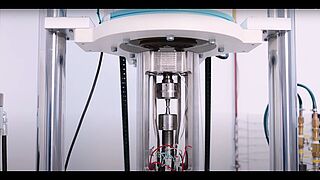Materials and Components Testing Under the Influence of Hydrogen
Hydrogen is considered the energy carrier of the future, which still requires extensive materials testing on its effects on metallic materials during transport and storage. These types of investigations are a requirement and go well beyond standard tests. The Materials Testing Institute (MPA) of the University of Stuttgart in Germany has collected many years of experience in this field, and relies on different servohydraulic testing machines from ZwickRoell.
Testing of metallic materials
Numerous metallic materials become brittle under the direct influence of hydrogen, which results in a reduction in ductility and thus elongation at break. Material concepts for these innovative applications must therefore be validated under realistic conditions.
The influence of hydrogen on metals comes from direct contact with compressed hydrogen or other hydrogen-containing media, which cause the material to become brittle and suddenly fail under load. These failure mechanisms, among other things, are investigated using fracture mechanics testing.


Testing with ZwickRoell
The range of tests conducted by the MPA Stuttgart includes material behavior in compressed hydrogen and liquid hydrogen at temperatures of 563 K up to 4 K, and thus close to absolute zero. Tests include deformation and failure behavior including crack initiation and crack propagation under static and oscillating loads.
ZwickRoell HA series and HC series servohydraulic testing machines with a dynamic nominal force of up to 100 kN are used to perform the tests. Compressed hydrogen tanks up to 400 bar are integrated in the testing machines as standard. Special versions are available for up to 1,000 bar. The compressed hydrogen is prepared using a hydrogen compressor.
Among others tests, the testing machines are used to examine fracture mechanics on CT specimens, slow strain rate behavior (SSRT), or fatigue properties using notched threaded-end specimens.
